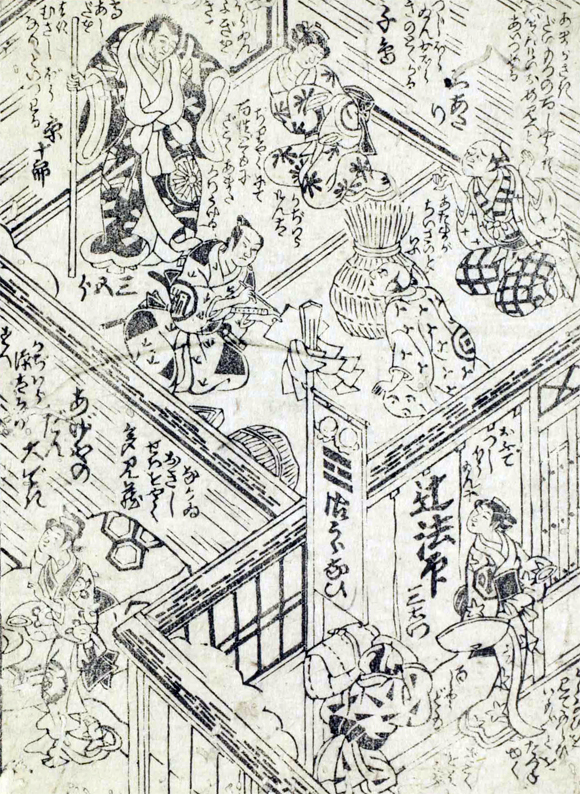| TSUJI HďIN |
| Play title | Hirakana Seisuiki |
| Common title | Tsuji H˘in |
| Authors | Matsuda Bunk˘d˘ Miyoshi Sh˘raku Takeda Izumo I Takeda Koizumo I Asada Kakei |
| History |
The play "Hirakana Seisuiki" was originally written for the puppet theater (Bunraku) and staged for the first time in the 4th lunar month of 1739 in ďsaka at the Takemotoza. It was adapted for Kabuki the following month and staged for the first time in the 5th lunar month of 1739 in Ky˘to at the Minamigawa no Shibai, produced by Mizuki Tatsunosuke II for the nadai Hoteiya Umenoj˘ [casting]. Then, the play "Hirakana Seisuiki" was performed for the first time in ďsaka in the 9th lunar month of 1740: it was produced at the Kado no Shibai by Nakamura Jűz˘ I and the only know actor in the casting was Nakamura Tomijűr˘ I in the role of Chidori. This play was staged for the first time in Edo in the 7th lunar month of 1753, at the Ichimuraza [casting]. |
| Structure |
The play "Hirakana Seisuiki" is made up of 5 acts. "Tsuji H˘in" is the opening scene of the fourth act, which ends with "Kanzaki Ageya". "Tsuji H˘in" is no more part of the current Kabuki repertoire but it could be revived at the National Theatre in the future to come. The last-recorded performance was in December 1943 in Nagoya at the Misonoza. |
| Key words |
Ageya Genpei Kassen Genpei-kassenmono Gidayű Ky˘gen Hyakush˘ Jidaimono Kajiwara Genta Kagesue Kuruwa Minamoto Yoshitsune |
| Summary |
Tsuji H˘in Since he was expelled from his father's house, Kajiwara Genta has found no employment. When his slender resources gave out, his lover Chidori, who had left the house with him, was forced to become a courtesan in the pleasure quarter of Kanzaki. Genta himself took refuge in the house of a fortune-teller in ďsaka in the district of Nishinari Kashima. Chidori's sister, Ofude, is searching for her and, seeing the fortune-teller's sign, calls at the house to see if she can learn from him of Chidori's whereabouts. Ofude does not have any idea that her sister's lover is actually living in this house and Genta, unfortunately, is absent when she visits the house. To her disappointment, the fortune-teller can give her no indication where Chidori can be. Ofude sadly leaves. Genta now returns and tells the fortune-teller that he has learned that Minamoto no Yoshitsune is preparing to launch an attack against the enemy at dawn the next day. Genta sees in this a chance to distinguish himself in battle at last and by his bravery return himself to the family that disinherited him. He needs his armor, which Chidori took with her for safekeeping when she became a courtesan. No armor means no fight. Too poorly dressed even to call at the ageya where she serves, Genta conceives of a plan by which he will pose as a factor of Yoshitsune and demand of some local farmers (hyakush˘) some rice to provision Yoshitsune's troops. The farmers, however, challenge his credentials and refuse to part with their stores until they receive an order directly from Benkei, chief of the general's staff. Genta persuades the fortune-teller to disguise himself as Benkei. The disguise is ridiculously imperfect but the pretence is convincing enough for the farmers, who all hand over their rice without further delay. Genta has now the money he needs to present himself suitably dressed at the tea house to obtain from Chidori the armor he had left with her. |
 |
|
Illustration from the ezukushi banzuke for the "Tsuji H˘in" scene of the drama "Hirakana Seisuiki", which was staged in the 12th lunar month of 1783 at the Naka no Shibai with Arashi Sangor˘ II and Arashi San'emon VI in the roles of Kajiwara Genta Kagesue and Ofude |
|
|
| Contact | Main | Top | Updates | Actors | Plays | Playwrights | Programs | Links | FAQ | Glossary | Chronology | Illustrations | Prints | Characters | Derivatives | Theaters | Coming soon | News |